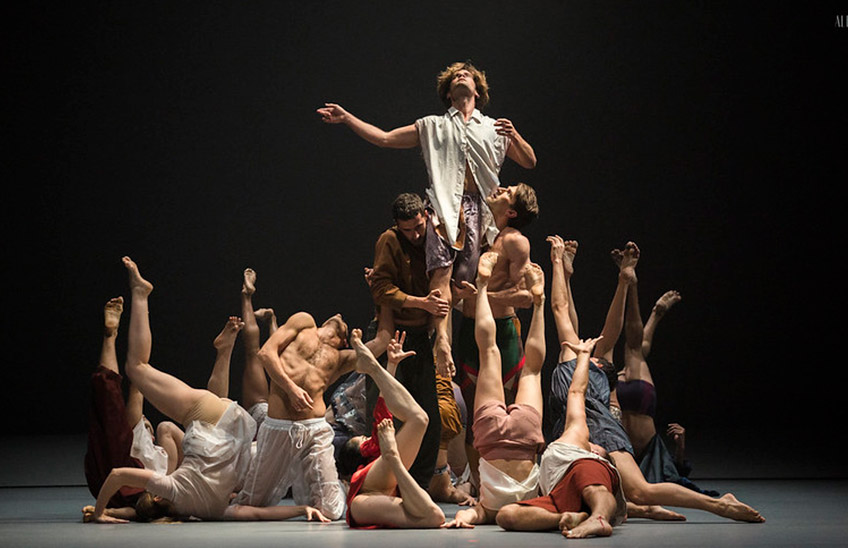The National Dance Company opens the Museum's season with a show that travels from classical to modern avant-garde.
It presents a program of neoclassical and contemporary dance that includes three very different pieces to enjoy a renewed company, full of nuances and wide registers.

FotoAlbaMuriel/The National Dance Company performs the piece 'In Paradisum', by the National Prize winner Antonio Ruz.
14 | 09 | 2021
The National Dance Company inaugurates the scenic season of Museo Universidad de Navarra this Thursday, at 7:30 p.m., at the Theater. It presents a program of neoclassical and contemporary dance that includes three very different pieces to enjoy a renewed company, full of nuances and wide registers. Thanks to the enlargement of the capacity according to the last published Foral Order, there are still tickets on sale, at a price of 32 euros.
After its success at the Teatros del Canal in Madrid, the Compañía Nacional de Danza, directed by Joaquín de Luz, arrives in Pamplona with a program that, in the words of Pino Alosa, deputy artistic director of the company, seeks to "show the range of stylistic possibilities of the company at this time, from classical and neoclassical, through the contemporary, to the avant-garde of dance today".
The program begins with Remansoschoreography by Nacho Duato on piano music by Enrique Granados and inspired by the world of Lorca. "In a way it represents the history of the company, since it is a piece by Duato, the choreographer who has created the most for the company and knew how to promote it internationally. Apart from being a great choreographer, he has enormous artistic talent and personality. His presence and work can only enrich our company," said Alosa.
Next comes Arriaga, choreographed by Mar Aguiló, Joaquín de Luz and Alosa himself, with music by Juan Crisóstomo Arriaga, considered the greatest Iberian exponent of late musical classicism, to whom this piece pays tribute. This proposal was created when they returned after confinement. "It was our way of celebrating the desire to be together. The piece has three different stylistic moments, which merge to amalgamate as a single choreographic proposal: a more classical part, with cutting-edge technique, a more neoclassical one and a more contemporary one. The union of the three styles shows that we have a versatile and polyvalent company and dancers".
A DANCE THAT CONNECTS
Closes the show In Paradisuma work by the National Dance Prize winner Antonio Ruz, for the National Dance Company, which proposes a dialogue between sacred and popular music, the sacred and the mundane, the collective and the individual, based on an original aesthetic concept inspired by the paintings of El Greco and the voices of the choral polyphony of Tomás Luis de Victoria.
Ruz explains that there is a symbiosis between these antagonistic concepts, which feed back on each other: "There is no heaven without hell. Opposites attract. Victoria's music led to a polyphonic, choral dance, and we sought to bring the idea of the different voices to the movement, so that with the dancers' bodies we could 'see' the music. In contrast to this universe of order and purity, we created a dialogue with more popular sounds such as free-jazz, rock or techno, which also have something of cult and mysticism for the masses. There are very complex and sophisticated choreographic phrases that dialogue with groups, formations and gestures that are much more everyday and urban. I like the audience to identify with the dancers, to humanize them".
In this sense, the choreographer explains that "In Paradisum is a shot of freedom, beauty and emotion that I believe leaves no one indifferent. Although the germ of the piece comes from years ago, it has been created entirely during the pandemic and that has affected the assembly. Dance is also a way out of suffering, a form of escape and connection with oneself, with what makes us feel part of a whole. I see the work as a human journey through time that connects the knowledgeable audience with those less accustomed to contemporary dance. Enjoying the cast of the National Dance Company in this new record is a unique opportunity that no one should miss.
HERITAGE AND CONTEMPORARY CREATION
To delve more deeply into the intrahistory of In Paradisum, the Museum organizes this Wednesday 15, at 7 p.m., Officium Defunctorumby Tomás Luis de Victoria, a meeting with the participation of Albert Recasens, ICS researcher, musicologist and expert in forgotten musical heritage, and Pablo Martín Caminero, double bass player and jazz composer. They will talk about the collaboration sponsored by Antonio Ruz, in which Caminero has created a musical piece from the historical recovery and recording of the Oficio de Difuntos made by Recasens. These two visions and two different processes put in dialogue have given rise to the musical basis of the piece In Paradisum. Admission is free until seating capacity is reached, by prior collection of an invitation on the website or at the box office.
The session is the first meeting of the series How to do things with...a new program of the Museum that addresses the relationship between heritage and contemporary creation. Musicians, choreographers, researchers and artists will explore cases of transformation or updating of cultural heritage in contemporary creation.